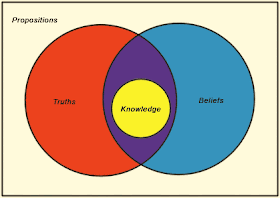Many authors and publishers have been working hard on trying to find that secret recipe so they can be the next in line to tap the American psyche. Given the success of books such as The Da Vinci Code, right now many believe the formula to be a mixture of God and history, with two parts puzzle and two cups of conspiracy theory generously mixed together and brought to a boil over heated cliffhangers.
Why would such a mixture seem so appetizing to the consumer? I believe that, given our recent turn to a postmodern culture, we're starting to see the inevitable consequences of the surrender of truth. People want to believe that old concepts of God are passé or that they are too restrictive. We need new paradigms, new ways of thinking about who God is and what He (or she or they or it, depending on one's presuppositions) really wants from us. The best way to do that is to make up fables about how the old stories aren't really true, and then start to believe your own fictions.
How Beliefs Matter
Now, there are people who believe a lot of strange things about the world. Some of these beliefs are less concerning than others. For example, I may have a belief that my shortcut to work in the morning saves me five minutes off my drive. That belief may or may not be true, but as long as I'm at work on time it has little impact on my life or the lives of others. If I'm wrong, it's not really a big deal, it merely means that I'm taking a little bit longer than I could have taken. Saving five minutes off my drive to work is not a crucial issue, so my belief about my shortcut is not a crucial belief.However, if I'm an ambulance driver then my belief about where the hospital is located and what is the fastest way to get there has a much bigger impact. If I believe the hospital is to the north when it is really to the south and I'm transporting a critical patient, then whether my beliefs are true or not become crucial. The issue of getting a critically ill patient to the emergency room is a very important issue, so it follows that truth becomes more important in this instance.
This illustrates a point that I want to make regarding beliefs - the more critical the issue, the more important it is to have true beliefs. When we look at truth claims, it makes sense to ask "How important is this belief? What kind of effect will it have if my beliefs are wrong?"
The Importance of a True Belief About God
This brings me to my main point, which is simply that the issue of who God really is and what we believe about Him is incredibly important. I hold that this is one of the most important beliefs one can have. Think about it for a moment. The belief in who God is and how He feels about individuals shapes the actions of a Mother Theresa or a William Wilberforce. It also shapes the actions of an Al-Qaida terrorist or a Heaven's Gate member.Beliefs about God are the starting point for all of morality, for how we view and treat other people, and how we should personally act. Therefore, having a false belief about God - who He is and what He really does expect from us - is a very serious problem. If you hold a false belief about God, it is a big deal, perhaps the biggest in your life. Because the stakes are so high, we need to examine our beliefs about God and not simply hold to those we "like" while discarding al those we don't. We need to make sure that our beliefs about God match what we can know about Him. It is simply foolish to think that you can pick and choose your God -narrative based on whether you liked the story that someone told or whether you like or dislike certain requirements for serving Him.
I have used the illustration that as a child there were many rules my mother set down for me that I didn't like. She made me eat those nasty vegetables. I had to go to bed at a certain time, and so on. However, as I grew and had children of my own, I see the wisdom in my mother's rules. Just because I didn't like them, didn't mean they weren't right or applicable to make me a better person.
Similarly, to deny aspects about God simply because you don't like them in no way proves that those aspects are not how God really is. God may actually be the type of being who seeks to communicate with mankind through the Scriptures. God may actually be the type of being who holds justice in high regard and because of that, He will judge the sinner. And God may actually be the type of being who also felt compassion for humanity and therefore became man to provide a way of escape from the judgment of sin.
It seems to me people want God both ways. They want to know that there's a real God out there; there exists someone who loves them and is in control of everything. This gives many people comfort and assurance. However, they also want to pick and choose what kind of God they believe in, and usually it's a God that looks a lot like themselves. However, holding a true belief about God is more important than that. I hope that as people continue to think about the claims of pop culture, they will also realize that a true belief may not be a popular one, but it must be recognized as true just the same.

No comments:
Post a Comment